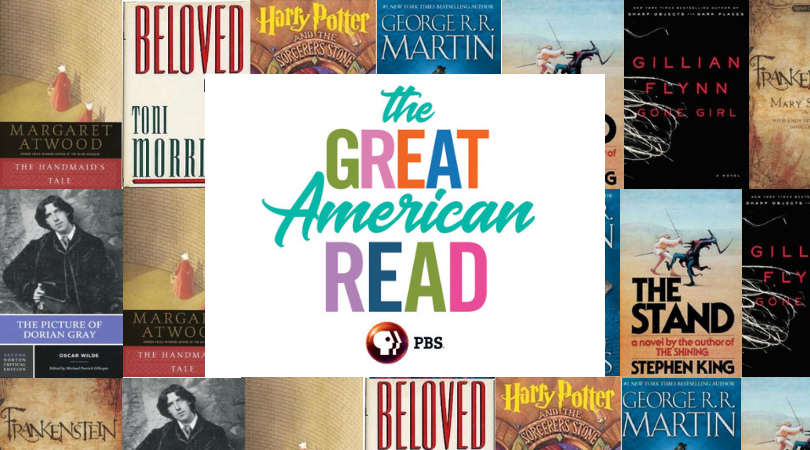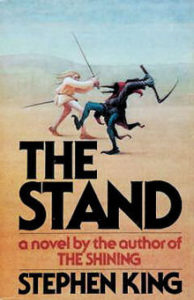

PBS’ The Great American Read—a new eight-part series that explores and celebrates the power of reading, told through the prism of America’s 100 favorite novels—returned to our screens last night with “Villains and Monsters”: the third, and altogether most dastardly, installment of the show.
The episode—which featured contributions from Margaret Atwood, Gillian Flynn, George R.R. Martin, Neil deGrasse Tyson, Allison Williams, Kevin Young, and more—focused on the marvelously malevolent black hats that stalk the pages of some of the country’s most beloved books: from Voldemort to Frankenstein’s monster (or Dr. Frankenstein himself, depending on where your sympathies lie), Dorian Gray to Randall Flagg, the Queen of Hearts to Moby Dick (or Captain Ahab, depending on where your sympathies lie).
As we do the day after each week’s themed episode airs, we looked back through our Classic Reviews Archive to show you what the critics first wrote about some of these now-iconic books and their evil antagonists.
Read on, if you dare….
*
Beloved by Toni Morrison
It never looked as terrible as it was and it made her wonder if hell was a pretty place too.
Fire and brimstone all right, but hidden in lacy groves.
“…another triumph. Indeed, Ms. Morrison’s versatility and technical and emotional range appear to know no bounds. If there were any doubts about her stature as a pre-eminent American novelist, of her own or any other generation, Beloved will put them to rest. In three words or less, it’s a hair-raiser … Through the different voices and memories of the book, including that of Sethe’s mother, a survivor of the infamous slave-ship crossing, we experience American slavery as it was lived by those who were its objects of exchange, both at its best—which wasn’t very good—and at its worst, which was as bad as can be imagined. Above all, it is seen as one of the most viciously antifamily institutions human beings have ever devised. The slaves are motherless, fatherless, deprived of their mates, their children, their kin. It is a world in which people suddenly vanish and are never seen again, not through accident or covert operation or terrorism, but as a matter of everyday legal policy … Beloved is written in an antiminimalist prose that is by turns rich, graceful, eccentric, rough, lyrical, sinuous, colloquial and very much to the point.”
–Margaret Atwood, The New York Times, September 13, 1987
*
Moby Dick by Herman Melville
It is not down on any map; true places never are.
“Of all the extraordinary books from the pen of Herman Melville this is out and out the most extraordinary. Who would have looked for philosophy in whales, or for poetry in blubber. Yet few books which professedly deal in metaphysics, or claim the parentage of the muses, contain as much true philosophy and as much genuine poetry as the tale of the Pequod’s whaling expedition … To give anything like an outline of the narrative woven together from materials seemingly so uncouth, with a power of thought and force of diction suited to the huge dimensions of its subject, is wholly impossible … [Readers] must be prepared, however, to hear much on board that singularly-tenanted ship which grates upon civilized ears; some heathenish, and worse than heathenish talk is calculated to give even more serious offence. This feature of Herman Melville’s new work we cannot but deeply regret. It is due to him to say that he has steered clear of much that was objectionable in some of his former tales; and it is all the greater pity, that he should have defaced his pages by occasional thrusts against revealed religion which add nothing to the interest of his story, and cannot but shock readers accustomed to a reverent treatment of whatever is associated with sacred subjects … [T]he artist has succeeded in investing objects apparently the most unattractive with an absorbing fascination. The flashes of truth, too, which sparkle on the surface of the foaming sea of thought through which the author pulls his readers in the wake of the whale-ship,—the profound reflections uttered by the actors in the wild watery chase in their own quaint forms of thought and speech,—and the graphic representations of human nature in the startling disguises under which it appears on the deck of the Pequod,—all these things combine to raise The Whale far beyond the level of an ordinary work of fiction. It is not a mere tale of adventures, but a whole philosophy of life, that it unfolds.
–London John Bull, October 25, 1851
*
When you play a game of thrones you win or you die.
A Game of Thrones by George R. R. Martin
“In a world where the approaching winter will last four decades, kings and queens, knights and renegades struggle for control of a throne. Some fight with sword and mace, others with magic and poison. Beyond the Wall to the north, meanwhile, the Others are preparing their army of the dead to march south as the warmth of summer drains from the land. After more than a decade devoted primarily to TV and screen work, Martin makes a triumphant return to high fantasy with this extraordinarily rich new novel, the first of a trilogy. Although conventional in form, the book stands out from similar work by Eddings, Brooks and others by virtue of its superbly developed characters, accomplished prose and sheer bloody-mindedness. Although the romance of chivalry is central to the culture of the Seven Kingdoms, and tournaments, derring-do and handsome knights abound, these trappings merely give cover to dangerous men and women who will stop at nothing to achieve their goals. When Lord Stark of Winterfell, an honest man, comes south to act as the King’s chief councilor, no amount of heroism or good intentions can keep the realm under control. It is fascinating to watch Martin’s characters mature and grow, particularly Stark’s children, who stand at the center of the book. Martin’s trophy case is already stuffed with major prizes, including Hugos, Nebulas, Locus Awards and a Bram Stoker. He’s probably going to have to add another shelf, at least.”
–Publishers Weekly, July 29, 1996
*
Harry Potter and the Sorcerer’s Stone by J. K. Rowling
There is no good and evil, there is only power and those too weak to seek it.
“…Though all this hocus-pocus is delightful, the magic in the book is not the real magic of the book. Much like Roald Dahl, J. K. Rowling has a gift for keeping the emotions, fears and triumphs of her characters on a human scale, even while the supernatural is popping out all over.
…
“Throughout most of the book, the characters are impressively three-dimensional (occasionally four-dimensional!) and move along seamlessly through the narrative. However, a few times in the last four chapters, the storytelling begins to sputter, and there are twists I found irritating and contrived. To serve the plot, characters begin behaving out of character. Most noticeably, Hagrid, the gentle giant of a groundskeeper who has selflessly protected Harry over and over, suddenly turns so selfish he is willing to let Harry be punished for something that is Hagrid’s fault. That’s not the Hagrid I’d come to know.
These are minor criticisms. On the whole, Harry Potter and the Sorcerer’s Stone is as funny, moving and impressive as the story behind its writing. J. K. Rowling, a teacher by training, was a 30-year-old single mother living on welfare in a cold one-bedroom flat in Edinburgh when she began writing it in longhand during her baby daughter’s nap times. But like Harry Potter, she had wizardry inside, and has soared beyond her modest Muggle surroundings to achieve something quite special.”
–Michael Winerip, The New York Times, February 14, 1999
*
Frankenstein by Mary Shelley
I ought to be thy Adam, but I am rather the fallen angel…
“Our readers will guess from this summary, what a tissue of horrible and disgusting absurdity this work presents. It is piously dedicated to Mr. Godwin, and is written in the spirit of his school. The dreams of insanity are embodied in the strong and striking language of the insane, and the author, notwithstanding the rationality of his preface, often leaves us in doubt whether he is not as mad as his hero. Mr. Godwin is the patriarch of a literary family, whose chief skill is in delineating the wanderings of the intellect, and which strangely delights in the most affecting and humiliating of human miseries. His disciples are a kind of out pensioners of Bedlam, and like ‘Mad Bess’ or ‘Mad Tom,’ are occasionally visited with paroxysms of genius and fits of expression, which makes sober-minded people wonder and shudder.
…
“But when we have thus admitted that Frankenstein has passages which appal the mind and make the flesh creep, we have given it all the praise (if praise it can be called) which we dare to bestow. Our taste and our judgement alike revolt at this kind of writing, and the greater the ability with which it may be executed the worse it is—it inculcates no lesson of conduct, manners, or morality; it cannot mend, and will not even amuse its readers, unless their taste have been deplorably vitiated—it fatigues the feelings without interesting the understanding; it gratuitously harasses the sensations. The author has powers, both of conception and language, which employed in a happier direction might, perhaps, (we speak dubiously,) give him a name among these whose writings amuse or amend their fellow-creatures; but we take the liberty of assuring him, and hope that he may be in a temper to listen to us, that the style which he has adopted in the present publication merely tends to defeat his own purpose, if he really had any other object in view than that of leaving the wearied reader, after a struggle between laughter and loathing, in doubt whether the head or the heart of the author be the most diseased.”
–John Wilson Croker, Quarterly Review, 1818
*
Gone Girl by Gillian Flynn
Friends see most of each other’s flaws. Spouses see every awful last bit.
“One of these narrators has to be unreliable. Maybe both are. It becomes apparent in a series of stunning reveals and whiplash reversals that these characters, like the book they’re in, aren’t what we thought they were. Gone Girl is a story about men and women who live double lives not because they’re secret agents or jewel thieves but because as human beings they’re incapable of being who they appear to be. Their whole personalities are crime scenes where evidence of their true selves has been hastily concealed—except that nothing stays hidden forever. ‘Can you imagine,’ Amy asks, ‘finally showing your true self to your spouse, your soul mate, and having him not like you?’ … Gone Girl is a hall of mirrors where everything is an empty reflection, including the people who live there. That makes it sound like a postmodern exercise in the deconstruction of subjectivity or something like that, which it isn’t. Its content may be postmodern, but it takes the form of a thoroughbred thriller about the nature of identity and the terrible secrets that can survive and thrive in even the most intimate relationships. Gone Girl begins as a whodunit, but by the end it will have you wondering whether there’s any such thing as a who at all.”
–Lev Grossman, TIME, July 11, 2012
The Handmaid’s Tale by Margaret Atwood
Better never means better for everyone… It always means worse, for some.
“Just as the world of Orwell’s 1984 gripped our imaginations, so will the world of Atwood’s handmaid. She has succeeded in finding a voice for her heroine that is direct, artless, utterly convincing. It is the voice of a woman we might know, of someone very close to us.
…
“The Handmaid’s Tale is a novel that brilliantly illuminates some of the darker interconnections of politics and sex, and it will no doubt be labeled a ‘feminist 1984.’ Yet it is Atwood’s achievement to have produced a political novel that avoids the pitfall of doctrinaire writing.
…
“Gilead threatens those who break its rules with extinction. Yet for Offred, the price of obedience is even higher—the death of the senses, the death of the spirit … Overwhelming loneliness and boredom afflict her even more than oppression. ‘Nobody dies from lack of sex,’ she discovers. ‘It’s a lack of love we die from. There’s nobody here I can love, all the people I could love are dead or elsewhere. Who knows where they are or what their names are now? They might as well as be nowhere, as I am for them. I too am a missing person.’
Offred’s plight is always human as well as ideological, and so is her inevitable assertion of her needs. Her tale, in Atwood’s masterful hands, is extraordinarily satisfying, disturbing and compelling.”
–Joyce Johnson, The Washington Post, February 2, 1986
*
The Picture of Dorian Gray by Oscar Wilde
The books that the world calls immoral are books that show the world its own shame.
“Why go grubbing in muck heaps? The world is fair, and the proportion of healthy-minded men and honest women, to those who are foul, fallen or unnatural is great. Mr Oscar Wilde has again been writing stuff that were better unwritten; and while The Picture of Dorian Gray, which he contributes to Lippincott’s, is ingenious, interesting, full of cleverness, and plainly the work of a man of letters, it is false art—for its interest is medico-legal; it is false to human nature—for its hero is a devil, it is false to morality—for it is not made sufficiently clear that the writer does not prefer a course of unnatural iniquity to a life of cleanliness, health and sanity. The story—which deals with matters only fit for the Criminal Investigation Department or a hearing in camera—is discreditable alike to author an editor.
Mr. Wilde has brains, and art, and style; but if he can write for none but outlawed noblemen and perverted telegraph-boys, the sooner he takes to tailoring (or some other decent trade) the better for his own reputation and the public morals.”
–The Scots Observer, July 5th, 1980

The Stand by Stephen King
Love didn’t grow very well in a place where there was only fear.
“Striking a far less hysterical tone than in The Shining, King has written his most sweeping horror novel in The Stand, though it may lack the spinal jingles of Salem’s Lot. In part this is because The Stand, with its flow of hundreds of brand-name products, is a kind of inventory of American culture. ‘Superflu’ has hit the U.S. and the world, rapidly wiping out the whole of civilization—excepting the one-half of one percent who are immune. Superflu is a virus with a shifting antigen base; that is, it can kill every type of antibody the human organism can muster against it. Immunity seems to be a gift from God—or the Devil. The Devil himself has become embodied in a clairvoyant called Randall Flagg, a phantom-y fellow who walks highways and is known variously as ‘the dark man’ or ‘the Walking Dude’ and who has set up a new empire in Las Vegas where he rules by fear, his hair giving off sparks while he floats in the lotus position. He is very angry because the immune folks in the Free Zone up at Boulder have sent a small force against him; they get their message from Him (God) through a dying black crone named Abigail, who is also clairvoyant. There are only four in this Boulder crew, led by Stu Redman from East Texas, who is in love with pregnant Fran back in the Free Zone. Good and Evil come to an atomic clash at the climax, the Book of Revelations working itself out rather too explicitly. But more importantly, there are memorable scenes of the superflu spreading hideously, Fifth Avenue choked with dead cars, Flagg’s minions putting up fresh lightbulbs all over Vegas. . . . Some King fans will be put off by the pretensions here; most will embrace them along with the earthier chilis.”
–Kirkus Reviews, November 1, 1978
*
The Great America Read TV Schedule
“Who Am I?”
Tuesday, September 18, 8:00-9:00 p.m. ET
Explore the ways that America’s best-loved novels answer the age-old question, “Who Am I?” From life lessons to spiritual journeys, these books help us understand our own identities and find our place in the world.
“Heroes”
Tuesday, September 25, 8:00-9:00 p.m. ET
Follow the trials and tribulations of some of literature’s favorite heroes. From Katniss Everdeen to Don Quixote, examine how the everyday hero and the anti-hero find their inner strength, overcome challenges and rise to the occasion.
“Villains and Monsters”
Tuesday, October 2, 8:00-9:00 p.m. ET
Learn why literature’s most notorious villains began behaving badly. Many weren’t born evil, but became that way when faced with some of the same choices we make every day. See what these villains can teach us about our own dark impulses.
“What We Do For Love”
Tuesday, October 9, 8:00-9:00 p.m. ET
Fall in love with some of literature’s most beautiful romances and explore the many forms of love, from family to passion to the unrequited type. Learn how America’s best-loved novels reflect the things we do for love.
“Other Worlds”
Tuesday, October 16, 8:00-9:00 p.m. ET
Take a magical journey to another world through some of America’s best-loved novels. From Middle Earth to Lilliput, the trials and tribulations of these alternate universes help us to better understand our own world.
“Grand Finale”
Tuesday, October 23, 8:00-9:00 p.m. ET
America’s best-loved novel is revealed.

